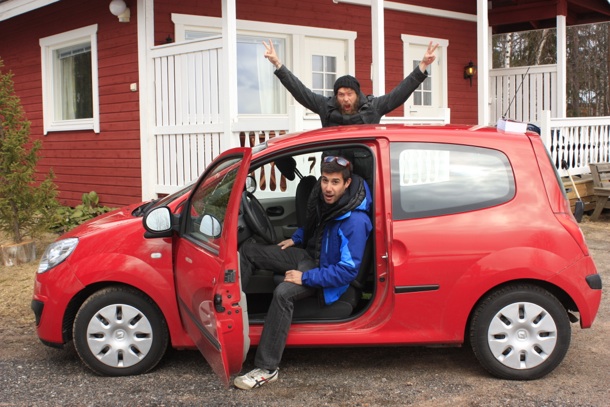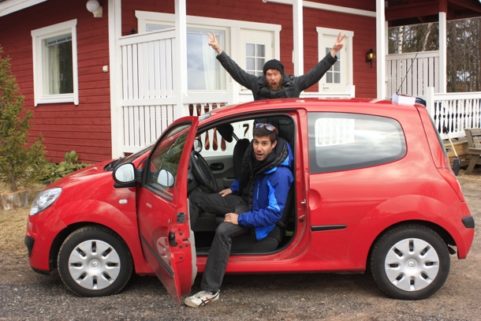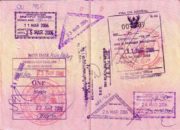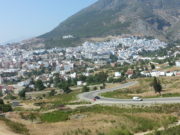Essential tips for safe travels

Road trip to Rovaniemi, Finland with the Shameless Traveler!
There’s no substitute for peace of mind and preparedness when traveling. Whether it’s a short vacation or long-term travel it’s important to make sure that you’re prepared. Anything can happen on a trip and these essential tips for safe travel will ensure that you’re safe when traveling.
Traveling and working around the world for the last 10 years most often I feel incredibly safe. Yet, just in case, I’ve developed a list of essential tips for safe travels that I use on nearly every trip I take, and I would encourage everyone out there to do the same. I know you’re parents will appreciate it!
Travel Health Tips
Register with IAMAT
IAMAT (International Association for Medical Assistance to Travellers) is a non-profit organization that offers health advice and a list of international network of qualified doctors and mental health practitioners.
In 2012 I was working in Japan and got a really bad cough. Worsening by the day I knew I needed to get medical attention. Using the IAMAT network I found a doctor who was qualified both in Japan and USA (he studied in California). Easily able to find his office and communicate with the doctor I was able to get my bronchiole infection diagnosed, and received medicine I needed.
Know the country emergency phone number
Surprise! 911 is not the emergency phone number in every country around the world. While traveling it’s important to know the emergency phone number in case of an emergency, so do your research!
http://en.wikipedia.org/wiki/Emergency_telephone_number
Travel with PolySporin (Neosporin)
If you meet any Canadians on the road they’ll probably have a tube of this miracle (infection protection) ointment. You’re bound to get a few everyday wounds while traveling; not protecting them properly can turn a small issue into a huge one! Polysporin helps protect wounds from infection and heal them faster.
Carry a travel first aid kit
One of the most underrated safety items that every traveler should have. You can get travel first aid kits at any outdoor store, and trust me when I say, you will eventually use it (hopefully in a minor capacity)!
I started traveling with a first aid kit after my trip to China three years ago. Hiking along Jiankou (an extremely steep unrestored section of the Great Wall of China) I slipped and gouged a chunk of my shin on a piece of the wall. Luckily, another Canadian traveler was hiking there, and had a brand new first kit with them, so I was able to clean it up and bandage it. I always bring first aid kit with me now!
Get travel health insurance
I’m sure you’ve all heard the horror stories of people who get hurt or sick on a trip then end up with massive medical bills when they get home. To be honest, it’s good to be protected when you travel because the financial burden of medical costs can be extreme depending on the injury and country. It’s good to feel safe and know you’re covered when you travel.
Travel Security Tips
Make digital copies of your passport
You should always have digital copies of your important documents in your email! You should also have a copy on your computer and/or smartphone (if you travel with one). If you lose you passport, it’ll be a lot easier to get a new one from your consulate if you have a copy of the passport.
Spread your money around
It’s a great idea to travel with some cash in your pocket. Depending on the counties you go to, money might not be as accessible as walking up to the nearest cash machine and taking it out. If you are traveling with cash you should spread it around your gear so that it’s not all in one place.
It’s a good idea to keep a little money in your wallet and adjust it depending on the countries you’re in (e.i. if you’re in India you’ll need a lot less than if you’re in Finland). You should also keep some money your big backpack (or travel bag) and spread that around in different pockets. If you’re at a hostel or hotel with a safe, you can also put the money there (just use good judgement).
Hide an extra credit card
Credit cards are a great way to pay for things. They also provide you with an emergency cash safety net. Simply swipe, and the card does the currency exchanges without having the hastle of exchanging money or carrying a lot of cash. If you bring one in your wallet, you should also hide an extra card in your luggage in case something happens and you need to use it.
Bring $250 USD
American money is accepted pretty much everywhere around the world. It’s important to have at least $250 when you’re traveling because you might need it to buy a visa (Russian Visas are purchased in American) or provide a bribe (to authorities or get into a country).
While traveling in Asia I met a couple friends who invited me to join them on an adventure on the Trans-Siberian railway. Not a part of my travel plans I had to quickly apply for visas and needed American money to do so. Countries like Mongolia, Russia, and Kazakhstan required me to purchase their visas in USD. Luckily, I was prepared and brought some American money with me.
Carry extra passport photos
It’s always good to have a few passport photos, especially if you’re going to be traveling long term or without a plan. This is because you might need to apply for visas, or in an emergency where you need a passport photo (losing you passport).
Bring a combination lock
If you’re staying in hostels its important to have a lock so you can secure your stuff. I used to use a key lock but realized that if I lose the key I’m not getting my stuff. Now I travel with a combination lock so that I can hide the code somewhere and always get access to my stuff.
Travel Safety Tips
Register with your home country
Registering with your countries registration for citizens abroad program notifies them of your whereabouts and keeps you connected in case of an emergency abroad. In the case of a natural disaster, civil unrest, or an emergency at home the government will know where you are, will notify you if there’s and emergency in your travel region, and give you access to consular services. These services are confidential.
- Registration for Canadians abroad
- Registration for Australians abroad
- Registration for Americans abroad
Eyes that travel see
When you’re traveling its important to know your surroundings. “Eyes that travel see,” means that you need to look ahead and know whats going on around you. If a part of the road is blocked ahead, know where to go instead. If an area you’re in is giving you a bad feeling, look around and
Write your accommodation address in the local language
You’re out for the night, having a good time, and now the party is over and you need to get home. If you’re in a country like China, speaking to a cab driver may not get you to where you need to go (even if you do know a few Chinese words). The best advice to getting to your accommodation is to write the address down in the local language.
While in Hangzhou, I decided to visit the downtown area for dinner and an evening tour of West Lake (one of China’s top tourist destinations). Early evening, when I was ready to head back to my hotel, I started to flag down taxi’s to take me home. Unfortunately, I only had the address written in English and my Mandarin pronunciation was so off that no one knew what I was asking. I eventually made it to my destination several hours later, but if I had the address written in Chinese I would have saved a lot of time and effort (walking most of the uphill way there).
Listen to locals
This is an especially easy safety tip to overlook. The more adventurous you get, the more places you’ve seen, the more barriers and stereotypes you’ve broken down, the more you’ll understand how inaccurate peoples perceptions are. Most places around the world are safe, but there’s a difference between perception of and area and a locals understanding of it. If a local gives you advice you should certainly listen, especially if they advise you not to go to a certain area (unless of course you’re a journalist or with a friend from the area).
Wear a seatbelt
Okay, so in a lot of countries this probably won’t be the norm, and in many cases isn’t possible. However, if there is a seatbelt to wear, you should definitely wear it. Driving practices around the world are far more chaotic than North America. If you’re in a vehicle with a seatbelt, you should set an example and protect yourself. Be smart and be safe; there’s a reason why it’s the law in many places!
Travel is extremely rewarding for both the traveler and the world around them. It helps to expand the worldviews of everyone involved, breaks down stereotypes, and creates a valuable experiential learning environment that nurtures personal growth. In order to protect yourself, these essential tips to safe travel will provide you and your family with peace of mind and protection as you explore the world.
Do you have an essential tip for safe travel that everyone should know?
Safe travels,
Yak
Thanks to Southern Cross Travel Insurance for supporting Borderless Travels through this post!










